|
|
|
Sort Order |
|
|
|
Items / Page
|
|
|
|
|
|
|
| Srl | Item |
| 1 |
ID:
100027
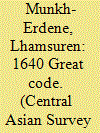

|
|
|
|
|
| Publication |
2010.
|
| Summary/Abstract |
Two recent studies, Johan Elverskog's Our Great Qing (2006) and David Sneath's The Headless State (2007), have made bold and fascinating contributions to overcoming the lingering legacy of representing and framing the pre-modern Inner Asian social and political order in terms of evolutionist, nationalist or nation-statist logics. Joining the cause and building on these works, yet critically examining them, this article argues that the late sixteenth and early seventeenth-century Mongolian political order was akin to that of the Holy Roman Empire and the 1640 Great Code was an Inner Asian parallel to the Treaty of Westphalia.
|
|
|
|
|
|
|
|
|
|
|
|
|
|
|
|
| 2 |
ID:
100030
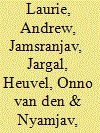

|
|
|
|
|
| Publication |
2010.
|
| Summary/Abstract |
In comparison with their impacts elsewhere, humans have trodden relatively lightly on Mongolia's ecosystems and there is an opportunity to conserve globally threatened wild species and maintain natural ecological processes in parallel with modern economic development, but only if co-ordinated action is taken soon. Mongolia has a low population density (ca 1.68 per km2) and the pastoral lifestyle is suited to the landscape. Yet humans have degraded grasslands, damaged forests, depleted wildlife populations and polluted and overused water. Rapid social and political changes have resulted in far-reaching impacts on Mongolia's fragile ecosystems. The country is a major recipient of both foreign aid and foreign direct investment, and it is important to guide economic development with the best ecological judgment available before permanent damage is done. Government has a responsibility to establish a legal, policy and fiscal framework that provides incentives for sustainable use of the land compatible with the survival of Mongolia's wild species and ecosystems. A regional biodiversity conservation strategy for the Mongolian Altai examined direct and indirect threats and laid out a programme of actions under 12 major objectives.
|
|
|
|
|
|
|
|
|
|
|
|
|
|
|
|
| 3 |
ID:
100029
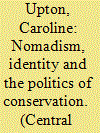

|
|
|
|
|
| Publication |
2010.
|
| Summary/Abstract |
This paper highlights the continuing importance of nomadism as an aspect of identity in contemporary Mongolia, and one which retains strategic, discursive and material resonance at diverse scales. It examines the contested representations and practices of nomadism with particular reference to conservation and to relations with land and nature. At a national level, nomadism remains a powerful, albeit romanticized, symbol of collective identity, often deployed, for example by urban elites with reference to a 'glorious past' (Bruun 2006). At the same time emergent urban identities are increasingly important in informing national self-representations of Mongolia, while contemporary nomadic herders are subject to contrasting discursive portrayals in mainstream conservation debates and policies. Particular concepts of relations with nature, including re-emergent spiritual dimensions, are highlighted as aspects of nomadic identity and practice at local levels, and their contrasts to and accommodation with donor-driven conservation projects explored. Finally, the paper highlights the emergent Global Pastoralists' movement as an important arena wherein Mongolian pastoralists can begin to deploy their own discursive representations of contemporary nomadic identities.
|
|
|
|
|
|
|
|
|
|
|
|
|
|
|
|
| 4 |
ID:
100031
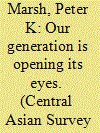

|
|
|
|
|
| Publication |
2010.
|
| Summary/Abstract |
This study examines the development of popular music in Mongolia over roughly four decades, focusing in particular on the emergence of globally inspired hip-hop and rap music. This is the period in which Mongolian popular musicians found their own voice within a rapidly expanding cultural mainstream. Hip-hop emerged within this mainstream as both a product of these developments and the result of the rise of a new generation of young people who defined themselves as distinct from the older, 'socialist-era' generations and used this music to declare this. The story of hip-hop's development provides us with a window onto the changing social, political and economic landscape of post-socialist Mongolia.
|
|
|
|
|
|
|
|
|
|
|
|
|
|
|
|
| 5 |
ID:
100026
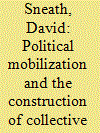

|
|
|
|
|
| Publication |
2010.
|
| Summary/Abstract |
In the twentieth century, Mongolia became subject to the Soviet version of nationalist thought. As the state constructed a single national 'people' (undesten, ard tumen) it also, following the Soviet model, constructed the past in terms of tradition (ulamjlal), and launched the ethnographic project of identifying and describing sub-national 'ethnic' groups or tribes (aimag, yastan). Since the collapse of Soviet-style state socialism and the introduction of multi-party parliamentary politics, notions of both tradition and collective identity have become potential resources, particularly for politicians, to mobilize public support. Concepts of 'local homeland' (nutag) are particularly significant, reflecting to some degree the importance of social networks. This paper explores the ways in which Mongolians reconstruct tradition, assert collective identity and deploy concepts of belonging.
|
|
|
|
|
|
|
|
|
|
|
|
|
|
|
|
| 6 |
ID:
100028
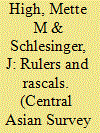

|
|
|
|
|
| Publication |
2010.
|
| Summary/Abstract |
This article examines the politics of gold mining in the Mongolian cultural region during the Qing period and today. By drawing on archival material and accounts by travellers of the period, the authors situate the current mining boom within its greater historical context. Since the exploration of gold has been surrounded by enduring notions of exclusivity and purity, the article shows how mining for gold has historically been closely related to Mongolian practices of political rulership. By examining the current mining boom in Mongolia from a broader historical perspective, the article argues that this extractive economy involves much more than a search for profit.
|
|
|
|
|
|
|
|
|
|
|
|
|
|
|
|
|
|
|
|
|